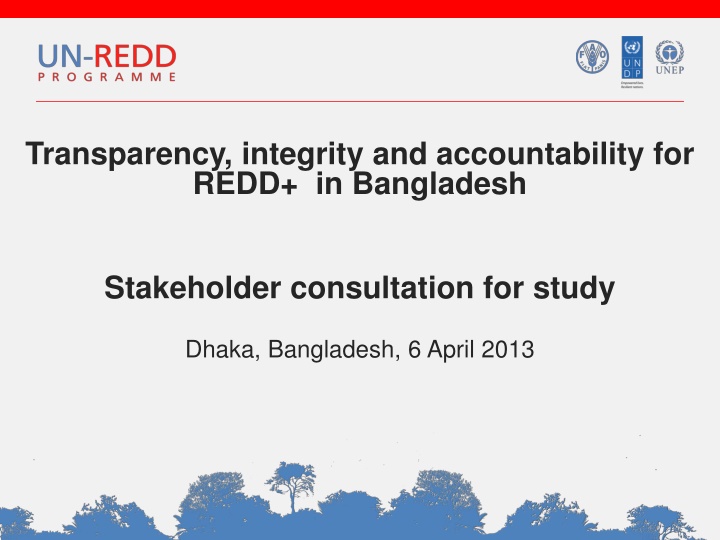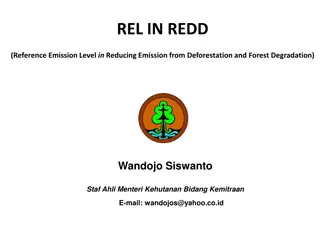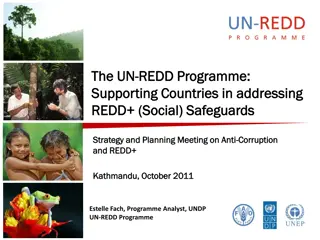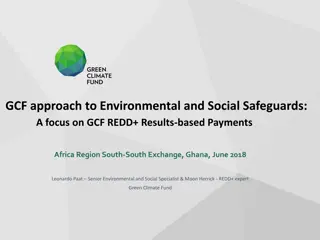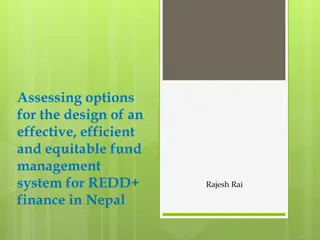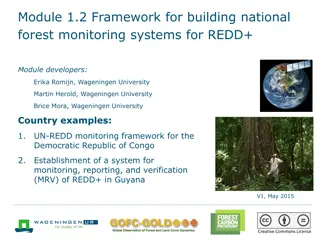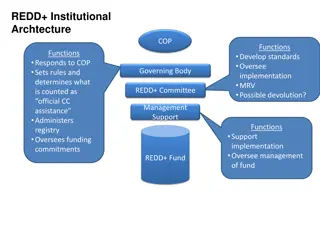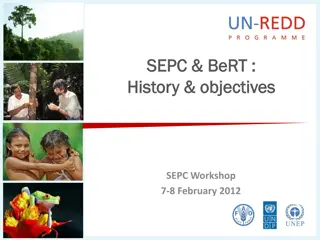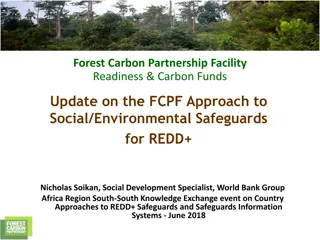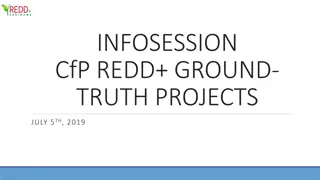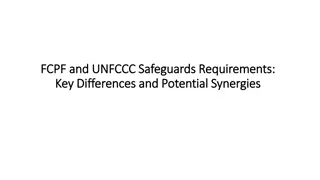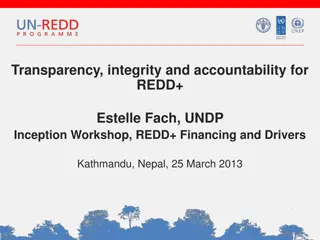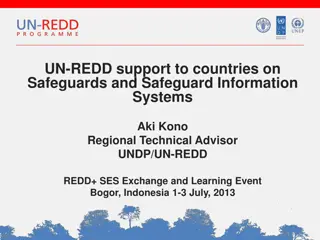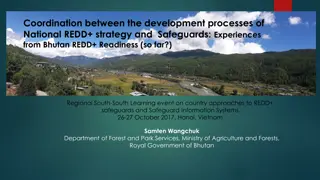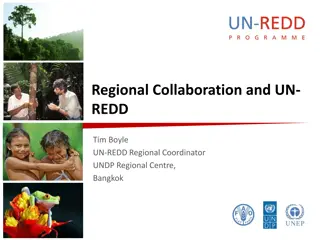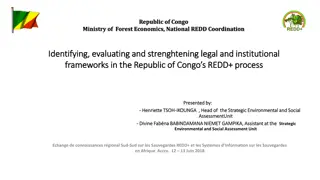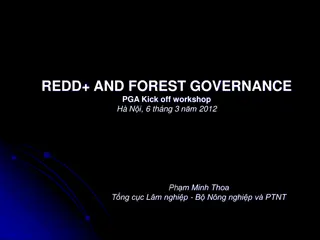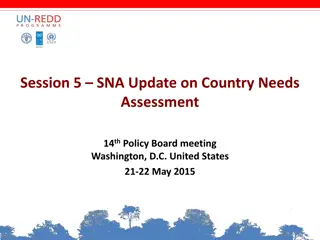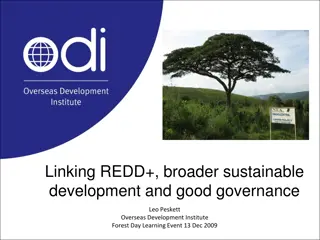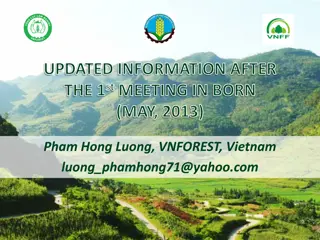Ensuring Governance and Integrity in REDD+ Implementation
Emphasizing the critical importance of transparency, integrity, and accountability in REDD+ initiatives in Bangladesh, this study highlights the detrimental effects of corruption on the effectiveness, efficiency, equity, and sustainability of forest conservation efforts. It identifies existing practices and potential risks that could undermine the integrity of REDD+ projects, urging stakeholders to address governance challenges both within and beyond the forestry sector to enhance the impact of environmental conservation measures.
Download Presentation

Please find below an Image/Link to download the presentation.
The content on the website is provided AS IS for your information and personal use only. It may not be sold, licensed, or shared on other websites without obtaining consent from the author.If you encounter any issues during the download, it is possible that the publisher has removed the file from their server.
You are allowed to download the files provided on this website for personal or commercial use, subject to the condition that they are used lawfully. All files are the property of their respective owners.
The content on the website is provided AS IS for your information and personal use only. It may not be sold, licensed, or shared on other websites without obtaining consent from the author.
E N D
Presentation Transcript
Transparency, integrity and accountability for REDD+ in Bangladesh Stakeholder consultation for study Dhaka, Bangladesh, 6 April 2013
Why focus on governance and integrity issues in REDD+ ? 1. The big picture Impact of corruption and illicit financial flows on human rights and development 2. National frameworks and international agreements Cancun safeguards United Nations Convention Against Corruption, ADB/OECD Anti- Corruption Initiative for Asia and the Pacific National Integrity Strategy 3. The pragmatic reasons : effectiveness, efficiency, equity, confidence and sustainability of REDD+
Lack of integrity in REDD+ would: 1. Undermine effectiveness 2. Undermine efficiency 3. Undermine equity 4. Discourage investors sustainability of REDD+ Governance challenges also lie outside the forestry sector
Lack of integrity in REDD+ 1. Existing practices that enable/enhance deforestation and forest degradation Turning a blind eye on illegal logging (felling, transport, certification) in exchange for a bribe Falsely and illegally issued logging licenses and concessions Elite capture of forests resources and benefits Deliberate information retention about forest resources and harvest
Lack of integrity in REDD+ 1. Existing practices that enable/enhance deforestation and forest degradation Turning a blind eye on illegal logging (felling, transport, certification) in exchange for a bribe 2. New risks brought about by REDD+ Risks related to decisions about land rights or land use that can favor one powerful group over a marginalized group Risks related to fund management (embezzlement) Risks related to distribution of benefits at local level (informal taxes, embezzlement) Fraud related to MRV Money laundering of REDD+ assets ... Falsely and illegally issued logging licenses and concessions Elite capture of forests resources and benefits Deliberate information retention about forest resources and harvest
Different phases of REDD+ imply different risks Phase 1 : institutional set up and strategy- making Phase 2 : implementation of policies and pilots Phase 3 : MRV and performance payments Influencing decisions to favor one group over more vulnerable ones Turning a blind eye on non-respect of measures Embezzlement of funds, money laundering
REDD+ readiness presents opportunities to tackle these risks and promote transparency and accountability in the forest sector and in fund management 1. Transparent, inclusive, balanced, multi-stakeholder decision-making processes can mitigate the risk of back-door deals 2. Timely, usable access to relevant information about REDD+ processes, decisions and systems can enhance oversight, effectiveness and trust 3. Technical transparency tools can be developed to instill transparency in the movement of funds 4. Well-maintained and accessible REDD+ project registries can be turned into important transparency tools 5. Inclusive monitoring, social audits and early warning dialogues systems can enhance trust, responsiveness and rapid remedial actions 6. Clear tenure rights can mitigate small scale illegal logging 7. Safeguard information systems can include strong transparency indicators 8. Free prior and informed consent
Who are the actors of integrity in REDD+ ? REDD+ Cell, Steering and Advisory Committee Civil society and indigenous organizations Oversight bodies Law enforcement, justice system or special courts Media Parliamentary commissions and legislators Neighbour countries International partners
Study : REDD+ Integrity in Bangladesh Objective : analyze risks to REDD+ and formulate practical transparency and accountability recommendations that can inform the Bangladesh readiness process, and in particular the REDD+ readiness roadmap and funding proposals.
Study : REDD+ Integrity in Bangladesh Stakeholders Stakeholders and information providers Anonymous questionnaire, interviews, focus group discussions Periodic guidance and feedback Core stakeholders REDD cell and UNDP/UN- REDD Lead
Suggested study methodology ASSESSMENT OF INTEGRITY GAPS AND NEEDS Focus Group Discussions and interviews Literature review Questionnaire Regional Workshops Summaries Synthesis of perceptions Preliminary report Final report and integration into national REDD+ process National Validation workshop
Parameters Enabling environment Specific for REDD+ roadmap Anticorruption framework Fund management systems Policy-making Participation Legal frameworks Transparency and access to information Citizen demand for accountability Fund management system Procurement policies and systems Transparency and access to information Complaints and justice delivery Safeguards Complaints and justice delivery Governance in forest sector
Study : REDD+ Integrity in Bangladesh Literature review Background and existing reports Analysis of laws, policies and systems 2009 Right to Information Act Forestry Master Plan Whistleblower Protection Existing Climate Fund management systems Existing benefit distribution systems (Social Forestry) Global guidances The role of freedom of information in REDD+ (UN-REDD 2013) UN-REDD Guidance on Conducting REDD+ Corruption Risks Assessment Transparency International s Keeping REDD + Clean
Study : REDD+ Integrity in Bangladesh Anonymous survey to assess perception Three objectives: As an awareness-raising tool To provide initial insights on the major concerns expressed by stakeholders To point to trends in perceptions among different stakeholder groups (such as NGOs and CSOs, private sector, women, youth, government agencies, anti- corruption bodies etc). Similar to those conducted during a UN-REDD Regional Workshop in 2011 and in other countries (Philippines, DRC) Sample questions : Evaluate the likelihood that there would be secret agreements to favour certain types of REDD+ activities (for example, SFM vs. conservation) Evaluate the impact that this risk would have
Study : REDD+ Integrity in Bangladesh Interviews and focus group discussions Sample questions : What is your knowledge of, or experience in using the Right to Information Act? What is your knowledge of, or experience in using feedback, grievance, conflict resolution and redress mechanisms? Do bodies/agencies relevant to REDD+ apply internal controls and external auditing to their fiscal spending? How effective are these? Not the same questions to all interviewees or groups!
Seeking stakeholders responses Online anonymous survey INDIVIDUAL INTERVIEWS STAKEHOLDER WORKSHOP FGD CHT CHT SYLHET ACADEMIA-10% 3 10 1 FOREST DEPARTMENT 20% SUNDARBANS COX S BAZAR CHT 3 10 1 LOCAL SYLHET SUNDARBANS SUNDARBANS GOVERNMENT 3 10 1 10% CIVIL SOCIETY GREATER SYLHET 30% 20 ADMINISTRATION DHAKA 10% 20 SAWMILL 10% FURNITURE INDUSTRY 10%
Estimated timeline Estimated timeline 15 April 30 April 15 May 31 May 15 June LITERATURE REVIEW STAKEHOLDERS RESPONSES Questionnaire study (desks + fields) FGD Individual interviews * Stakeholder workshops INITIAL REPORT Draft Draft review * Validation workshop * FINAL REPORT for integration into roadmap
Questions 1. Do we have the right stakeholders to be polled/interviewed? Are the areas for targeted focus group discussions appropriate, given you knowledge or REDD+ potential ? 2. Do you recommend particular reports/activities to look into? 3. General comments on methodology ?
Estelle Fach & Dr. Danesh Miah estelle.fach@undp.org dansforestry@yahoo.com Thank You. We look forward to your recommendations
